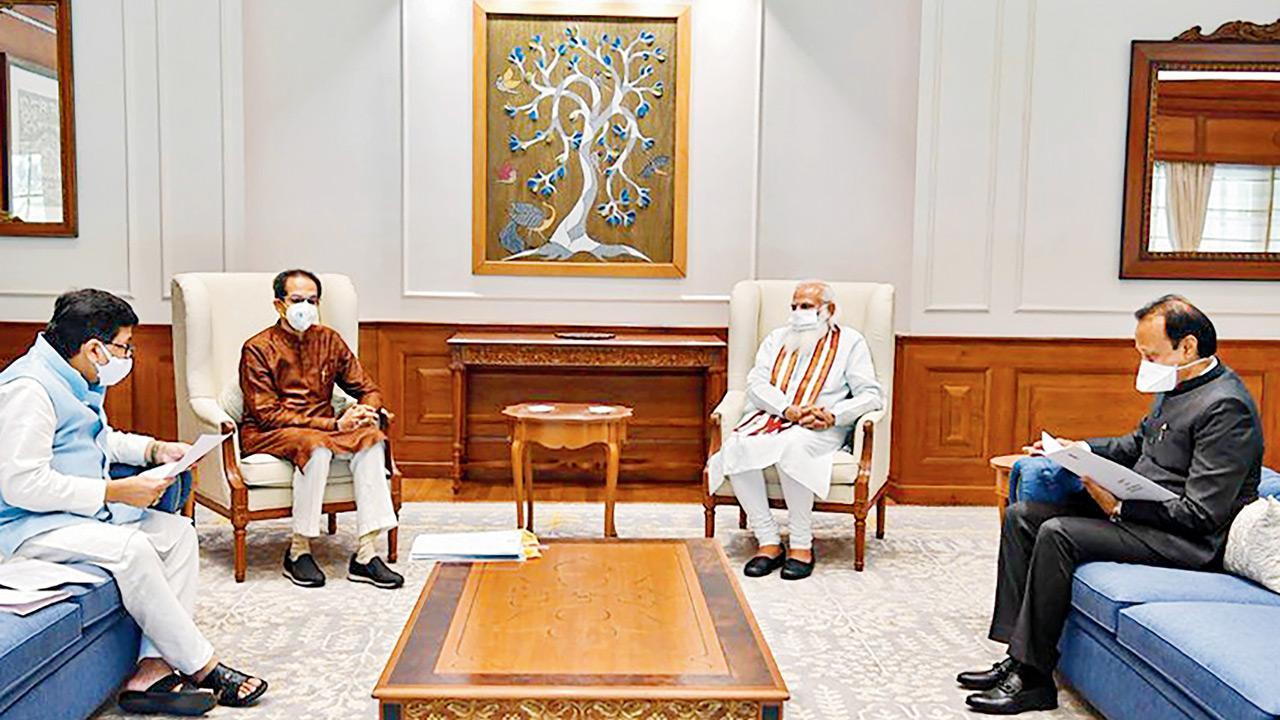MVA constituents seem to be playing with each other to ensure continuation amid talk of instability

PWD Minister Ashok Chavan, Chief Minister Uddhav Thackeray, Prime Minister Narendra Modi and Deputy Chief Minister Ajit Pawar during their meeting last week in New Delhi. Thackeray and Modi had their one-on-one meet before this meeting. File pic
Power binds. Leaders of the Maha Vikas Aghadi (MVA) are well aware of this phenomenon. The tripartite arrangement also knows that if power binds, it can break them as well. So, in order to keep the show running, expect the MVA partners to keep each other under pressure to be part of the game as long as it works fine for them. Recent developments, a series of meetings between the political who’s who and the meaningful statements they made reaffirms the understanding that their differences notwithstanding, the Shiv Sena, the Nationalist Congress Party and the Indian National Congress would try their best to cohabit to have a full five-year term in Maharashtra.
ADVERTISEMENT
It seems the Bharatiya Janata Party (BJP) would require a restructured template to make headway for breaking up the tripartite alliance mid-term, though it has been predicting that the internal squabbles would lead to the MVA’s fall. BJP leaders have been giving deadlines for the collapse as if they were actively involved in the demolition plan, but they had to eat their own words.
Last week, Uddhav Thackeray’s one-on-one meeting with PM Narendra Modi triggered a tsunami of speculations over the stability of the MVA government. The incident appeared to be a fitting reply to Pawar’s much-reported meeting with Home Minister Amit Shah in March. The Pawar-Shah meeting wasn’t confirmed, but to the chagrin of the MVA partners and his detractors in the BJP, Thackeray made no bones about telling the world that his relations with Modi were intact. Unlike his 2019 meeting with Shah, what transpired at the PM’s house could well be a secret till the two leaders wish to keep it that way. In Shah’s case, Thackeray had told his party workers that the Sena was promised the CM’s post and 50 per cent share in power if it became the BJP’s ally in the Lok Sabha and Assembly polls.
Subsequent denials that followed a break up between the two, which then led to the BJP’s short-lived government with the NCP’s splinter, and the formation of MVA government under Thackeray, are part of the state’s political history now. The last page in this chapter was Shah’s much-delayed personal denial. Before him, his juniors, especially ex-CM Devendra Fadnavis had denied that any such promise was made.
Knowing that a meeting between Modi and Thackeray carries so many different meanings, both sides are unlikely to reveal anything substantial anytime soon. After all, it is politically wise to let rumours, founded or unfounded, create different perceptions.
Two days after the Delhi do, the maverick in Pawar hit a masterstroke in reminding Thackeray of his late father Balasaheb Thackeray’s trustworthy way of keeping promises. In this case, he talked about the promise Balasaheb had made to Indira Gandhi, who was then battered by the Janata Party and was determined to return to power. Previously, the Sena had supported Indira’s decision to impose Emergency and later, it did not contest the state Assembly polls in support of the Congress (Indira). Two years before it happened, Pawar had split the Congress to form his first government with the help of the Janata Party, which had replaced Indira’s rule in New Delhi. Indira came back with a thumping win and dismissed Sharad Pawar’s government, which was an MVA-like experiment, participated in by ideologically different leaders from the Congress, the right and left-wing parties.
A Janata Party constituent, Jan Sangh, later re-launched as the BJP, was also there in Pawar’s first cabinet. The Shiv Sena wasn’t part of this khichdi, but 40 years later, finds itself leading a similar mix which is far from an ensemble. Concerns rise in the MVA when Thackeray, as an evolving CM, explores independence and executes authority. So, it is natural for Pawar, who was at the helm during the MVA’s formative period, to try tightening the grip over important matters. It is then that he came up with a difficult to beat ‘act-like-your-father’ emotional pitch to give Thackeray a public message that the fear of adversaries and the consequences of a political fight shouldn’t worry him much after moving in a particular direction (against the BJP).
In saying so, Pawar kept the Congress high on hopes, invoking a revered figure like late Indira, who shared a cordial bond with Balasaheb; no matter how estranged Pawar was from the Gandhi family when the love happened between the Sena and Congress. It would be interesting to know the Congress’s take on the turn of recent events, and in particular, Pawar’s meeting with celebrated poll strategist Prashant Kishor, which has fuelled a raging debate of having a united opposition, with or without the Congress, to fight the BJP at the Centre.
Dharmendra Jore is political editor, mid-day. He tweets @dharmendrajore
Send your feedback to mailbag@mid-day.com
 Subscribe today by clicking the link and stay updated with the latest news!" Click here!
Subscribe today by clicking the link and stay updated with the latest news!" Click here!






